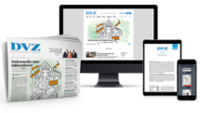
Patrick Schnieder on the logistics industry: Let's work together

With a clear commitment to strengthening transport infrastructure and improving conditions for all modes of transport, Federal Minister of Transport Patrick Schnieder opened transport logistic 2025 on Monday. Speaking to an international audience of experts, he emphasised the central role of logistics for prosperity, security and competitiveness in Germany and Europe. He described the trade fair as a hotspot for dialogue and exchange.
‘Logistics brings people together,’ said Schnieder at the start of his speech. ‘It transports goods, merchandise and raw materials to where they are needed.’ This requires an intact infrastructure. ‘Unfortunately, in many places, our transport routes are not as efficient and reliable as they should be and as they need to be. We have to change that.’
Schnieder announced plans to clear the backlog of renovation work across all modes of transport. The minister promised: ‘We will create a long-term, reliable financing basis for transport investments that is independent of the economic cycle.’ He particularly highlighted the bridge modernisation programme. Around 4,000 bridge structures on particularly important motorway sections are to be upgraded.
‘When you consider the area affected, you can say that we have already covered about a third of the way,’ said Schnieder. The railways are also undergoing major work: ‘We will completely renovate heavily used lines – tracks, points, signal boxes, sleepers and overhead lines.’
Faster planning and approval
To achieve results more quickly, Schnieder wants to make the procedures more efficient. ‘That's why we need to significantly speed up the planning and approval processes.’ With regard to combined transport in particular, he spoke out in favour of greater support for transhipment facilities.
Schnieder announced a financing and implementation plan for waterways. ‘We must make much greater use of this potential, especially in inland waterway transport.’ This also includes an efficient infrastructure for locks and ports. The national port strategy will continue to be implemented.
With regard to air transport, the minister emphasised the importance of the freight sector: ‘We must significantly improve the competitiveness of air transport.’ He advocated reducing location costs and making operating hours at central freight airports such as Frankfurt, Leipzig/Halle and Cologne more flexible. This would strengthen international competitiveness.
Focus on charging infrastructure for electric trucks
Schnieder also made a clear commitment to climate policy in road freight transport. Battery-powered trucks are on the rise – and with them the need for charging infrastructure. ‘In future, electric trucks should be able to quickly recharge their batteries at around 350 managed and unmanaged rest areas.’ This should cover around two-thirds of the expected charging demand. The tender process has already begun. At the same time, the minister announced funding for alternative drive technologies such as hydrogen and synthetic fuels: ‘Because we are and will remain open to all technologies, we are also promoting their use.’
Skills shortage and working conditions
Another focus for the Federal Minister of Transport is the shortage of skilled workers. ‘People who make sure that everything runs smoothly – every day, around the clock. Their work cannot be praised highly enough.’ Good working conditions are needed to attract and retain drivers: fair wages, regulated rest periods and sufficient secure parking spaces. A digital truck parking space information service is in the works. The ministry also wants to reform training: ‘In future, it should be possible to take the test to obtain the accelerated basic qualification in several foreign languages.’
Digitalisation as a key technology
The minister sees digitalisation as a decisive lever for modern logistics. ‘Digital applications make processes more efficient, more intelligent and therefore easier.’ He particularly emphasised the role of artificial intelligence: ‘It can help with planning optimal delivery routes, fleet management and predictive vehicle maintenance.’
The aim is to make Germany the leading market for autonomous driving – not only on the road, but also on the water. His ministry recently granted initial approval for remote-controlled inland waterway vessels. Another example is the Auto-GVZ project in Bremen, which is testing automated truck transport.
With a new truck traffic portal, the Federal Ministry of Transport is making anonymised toll data available for public transport planning for the first time. ‘Data from tolls helps to organise and control traffic even better.’
Reducing bureaucracy as an ongoing task
Finally, Schnieder emphasised the desire to reduce bureaucracy. Permits for heavy goods and large-volume transport must be expedited and documentation requirements reduced. ‘Relieving the industry of bureaucracy is also one of the priorities of the Road Freight Transport Commission.’
Schnieder concluded with an appeal: ‘Let's work together to make Germany a strong logistics location.’ (rok)
